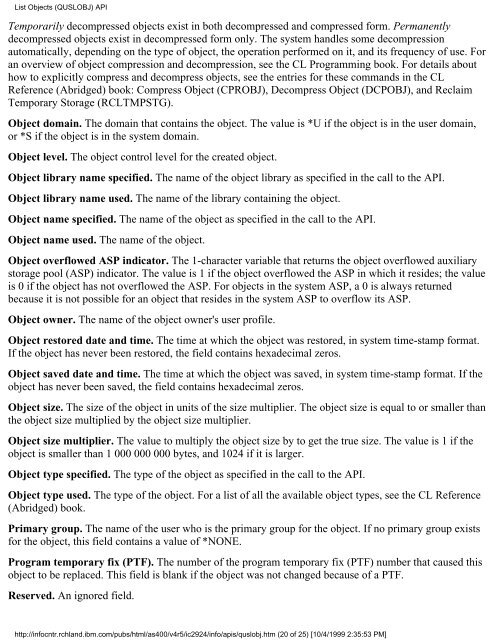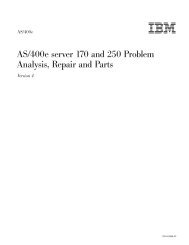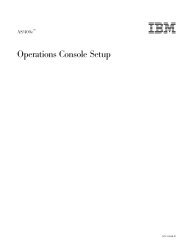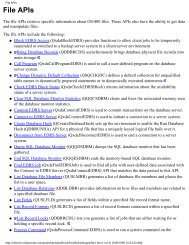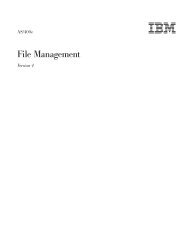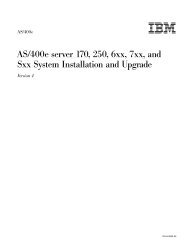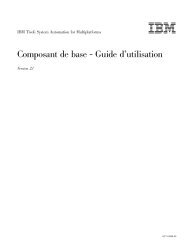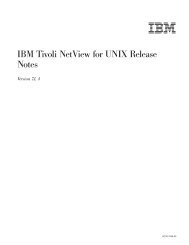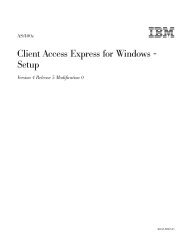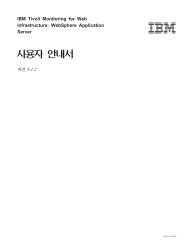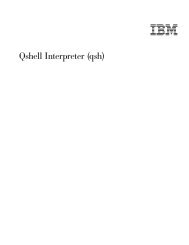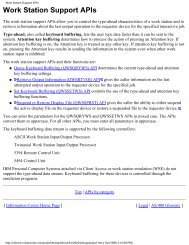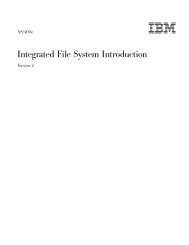Data Queue APIs--Categories - FTP Directory Listing - IBM
Data Queue APIs--Categories - FTP Directory Listing - IBM
Data Queue APIs--Categories - FTP Directory Listing - IBM
You also want an ePaper? Increase the reach of your titles
YUMPU automatically turns print PDFs into web optimized ePapers that Google loves.
List Objects (QUSLOBJ) API<br />
Temporarily decompressed objects exist in both decompressed and compressed form. Permanently<br />
decompressed objects exist in decompressed form only. The system handles some decompression<br />
automatically, depending on the type of object, the operation performed on it, and its frequency of use. For<br />
an overview of object compression and decompression, see the CL Programming book. For details about<br />
how to explicitly compress and decompress objects, see the entries for these commands in the CL<br />
Reference (Abridged) book: Compress Object (CPROBJ), Decompress Object (DCPOBJ), and Reclaim<br />
Temporary Storage (RCLTMPSTG).<br />
Object domain. The domain that contains the object. The value is *U if the object is in the user domain,<br />
or *S if the object is in the system domain.<br />
Object level. The object control level for the created object.<br />
Object library name specified. The name of the object library as specified in the call to the API.<br />
Object library name used. The name of the library containing the object.<br />
Object name specified. The name of the object as specified in the call to the API.<br />
Object name used. The name of the object.<br />
Object overflowed ASP indicator. The 1-character variable that returns the object overflowed auxiliary<br />
storage pool (ASP) indicator. The value is 1 if the object overflowed the ASP in which it resides; the value<br />
is 0 if the object has not overflowed the ASP. For objects in the system ASP, a 0 is always returned<br />
because it is not possible for an object that resides in the system ASP to overflow its ASP.<br />
Object owner. The name of the object owner's user profile.<br />
Object restored date and time. The time at which the object was restored, in system time-stamp format.<br />
If the object has never been restored, the field contains hexadecimal zeros.<br />
Object saved date and time. The time at which the object was saved, in system time-stamp format. If the<br />
object has never been saved, the field contains hexadecimal zeros.<br />
Object size. The size of the object in units of the size multiplier. The object size is equal to or smaller than<br />
the object size multiplied by the object size multiplier.<br />
Object size multiplier. The value to multiply the object size by to get the true size. The value is 1 if the<br />
object is smaller than 1 000 000 000 bytes, and 1024 if it is larger.<br />
Object type specified. The type of the object as specified in the call to the API.<br />
Object type used. The type of the object. For a list of all the available object types, see the CL Reference<br />
(Abridged) book.<br />
Primary group. The name of the user who is the primary group for the object. If no primary group exists<br />
for the object, this field contains a value of *NONE.<br />
Program temporary fix (PTF). The number of the program temporary fix (PTF) number that caused this<br />
object to be replaced. This field is blank if the object was not changed because of a PTF.<br />
Reserved. An ignored field.<br />
http://infocntr.rchland.ibm.com/pubs/html/as400/v4r5/ic2924/info/apis/quslobj.htm (20 of 25) [10/4/1999 2:35:53 PM]


